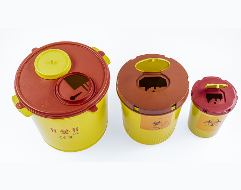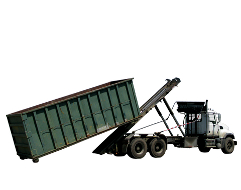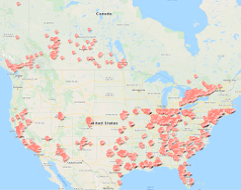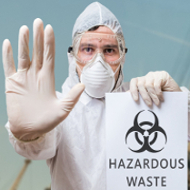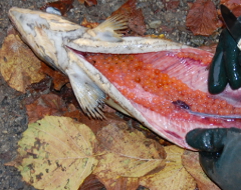Waste Recycling Fact File
A few interesting facts about existing and future waste management and recycling programs.
- The average person in the United Kingdom throws away 2 pounds (1 kilogram) of waste each day. In the United States, people throw away twice as much.
Household Garbage Thrown Away
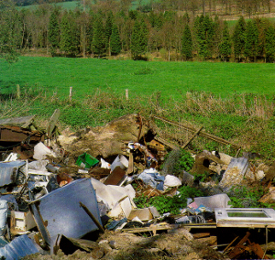
- Metal 8%
- Glass 7%
- Plants 18%
- Food 7%
- Wood 7%
- Plastic 8%
- Other 7%
- In many countries, huge amounts of disposable diapers are crowding landfills. The diapers produce a lot of methane gas and take centuries to break down. It is more environmentally friendly to use cloth diapers, which can be washed and reused.
-
Hundreds of years in the future, many of the world's resources, such as supplies of metals and coal, will have been used up. People may mine old landfill sites for valuable materials thrown away by people of the 20th and 21 centuries.
-
One garbage can full of ordinary household garbage can generate as much electricity as a bag of coal.
-
Farm animals produce a lot of waste in the from of droppings and manure. Some of this can be composted and used as a natural fertilizer on the fields. Animal waste can also be dried and burned in special power stations to produce electricity. This way, farm waste becomes a useful fuel.
- The limestone filters in power station chimneys have t be replaced regularly, which creates lots of limestone waste. This waste is a good fertilizer. Each year, power stations in the United States produce 100 million tons of limestone waste, enough to fertilize up to 25 percent of the county's farmland.
- The old fuel rods and nuclear reactor parts are highly radioactive, so they are placed in steel containers and surrounded by concrete. They have to be buried deep underground for hundreds, or even thousands, of years.
- The world's worst nuclear accident was in Chernobyl, Ukraine, in 1986. An explosion produced a radioactive cloud that spread across Europe. Radioactive rain fell in Scandinavia and Britain, contaminating grasslands and affecting animals and people.
- Beluga whales are found in the Great Lakes and the St. Lawrence River. Heavy industry has polluted the water with toxic chemicals, which build up in the body fat of sea mammals. The belugas eat contaminated fish. When dead whales wash up on the shores, they have to be treated as toxic waste because their bodies contain such high levels of pollutants.
- The United States recycles 28 percent of all domestic waste. The United Kingdom recycles only 14.5 percent of its domestic waste, but the figure is increasing each year.
- It takes 20 times more energy to make an aluminum can from bauxite that from an old aluminum can. As much as half of the aluminum in a drink can has probably been recycled.
- A person living in the United States uses 660 pounds (300 kilograms) of paper every year. That's twice as much as somebody living in the United Kingdom and 100 times more that a person living in India.
- Scrap Heap. In the United States, more than seven million cars are scrapped each year. The metal and some of the plastic can be recycled.
- Tire Tale. Each year more than 250 million tires are thrown away in the United States and a further 200 million in western Europe. The UK scrapped more than 50 million tires in 2001. According to a survey, 40 percent of tires went to landfills or dumps, 10 percent were retreaded, 22 percent recycled, 16 percent reused, and 3 percent went to engineering projects.
- In the Can. In 1996, more than 32 billion steel cans were made in the United States, and more than half were recycled. About 11 billion steel cans are used in the United Kingdom each year, but only 20 percent are recycled.
- Plastic Fantastic. Recycled plastic has many uses. For example, it can be used to make plant pots, fencing, and waterproof boots.
- Stripped Down. In the last 20 years, supermarket packaging has become one-third lighter. This helps cut down waste and saves energy. In some supermarkets in Germany, shoppers do not have to take home unwanted packaging. They remove it from the items they have bought and put it in special recycling bins.
- Steel Appeal. Steel is the world's most· recycled metal. More than 300 million tons are recycled every yearabout 40 percent of total worldwide liquid steel production. This saves 200 million tons of iron ore and 90 million tons of coal. "New" steel cans usually contain about 25 percent recycled steel.
This website from the Environmental Protection Agency explaining all about recycling.
www.epa.gov/recyclecity/
You can also contact local waste haulers for more information on different recycling programs:
- Contact DNS Disposal for more info on Boston, MA Recycling Programs and waste reduction
- Folks from Eastside Hauling & Container Services will provide you with Waste Recycling in Seattle, WA information.
- Get in touch with Right Away Disposal for proper waste disposal and recycling in Phoenix, AZ .
- In Sacramento, CA you can contact Atlas Disposal Industries for a professional consultation on proper junk removal and recycling in Sacramento Metro Area .
- Published: 2013-07-16T05:30:14-07:00
- Author: Laura Schmidt, Dumpster Rentals Customer Supp

